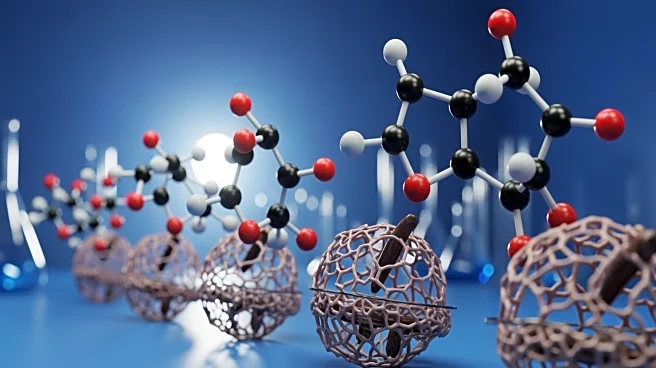What's Happening?
A recent study has provided structural insights into how macrolides, a class of antibiotics, inhibit bacterial translation in a context-specific manner. The research focused on the +X+ motifs in bacterial ribosomes,
which are critical for macrolide activity. The study revealed that macrolides can stall ribosomes by rearranging the mRNA structure, exposing the ribosome-binding site, and permitting the translation of resistance genes. This mechanism is influenced by the positively charged amino acid residues at the penultimate position of the growing polypeptide chain. The findings highlight the complex interaction between macrolides and bacterial ribosomes, offering a deeper understanding of antibiotic resistance mechanisms.
Why It's Important?
Understanding the context-specific action of macrolides is crucial for developing more effective antibiotics and combating bacterial resistance. The study's insights into the structural basis of macrolide-induced ribosome stalling could inform the design of new antibiotics that target specific bacterial strains. This has significant implications for public health, as it could lead to more targeted treatments for resistant infections. Additionally, the research underscores the importance of studying the molecular mechanisms of antibiotic action, which could pave the way for innovative approaches to overcoming resistance.
What's Next?
The study's findings may prompt further research into the development of antibiotics that exploit the context-specific inhibition mechanism of macrolides. Scientists may explore the potential of modifying existing macrolides or designing new compounds that can more effectively target resistant bacteria. There could also be increased interest in studying other antibiotic classes for similar context-specific actions. The pharmaceutical industry might invest in research and development to create antibiotics that are less prone to resistance, potentially leading to new treatment options for bacterial infections.
Beyond the Headlines
The study raises ethical considerations regarding the use of antibiotics and the potential impact on bacterial evolution. It highlights the need for responsible antibiotic use to prevent the emergence of resistant strains. Additionally, the findings may influence cultural perceptions of antibiotic treatment, emphasizing the importance of understanding the molecular basis of drug action. The research could also contribute to discussions on the balance between scientific innovation and the preservation of natural microbial ecosystems.










